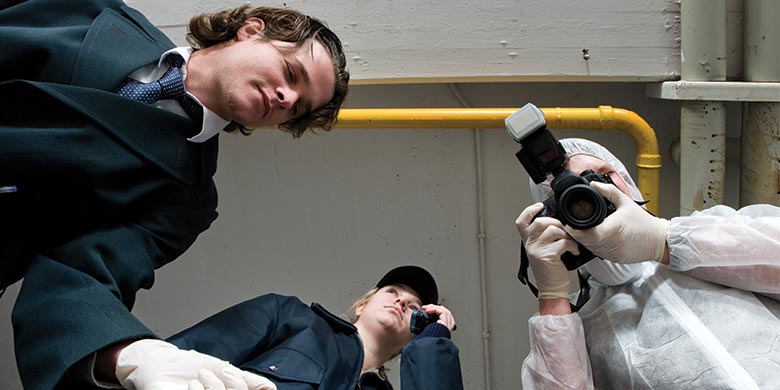Last updated on October 8, 2019
Criminal justice first become known as an academic discipline in the 1920s, and it refers to “the system of practices and institutions of governments directed at upholding social control, deterring and mitigating crime, or sanctioning those who violate laws with criminal penalties and rehabilitation efforts.” This distinguishes it from the field of criminology in that criminology actually refers to the study of crime as a social phenomenon. (So no, it’s not the same thing as criminology!)
Are Criminal Justice Degrees Worth It?
At DCCCD, an associate degree in Criminal Justice can mean a career path down many different routes: law enforcement, crime scene investigation, court reporting, private investigation and so much more. Criminal Justice degrees and certificates include the following options:
- Criminal Justice Associate in Applied Sciences Degree
- Associate in Arts Degree with a Field of Study in Criminal Justice
- Basic Criminal Justice Certificate
- Two Criminal Justice certificates, providing either 30 credit hours or 45-46 credit hours
- Criminal Forensics Certificate
(Please note that the availability of each degree or certificate will vary by campus.)
What Does a Criminal Justice Degree Consist Of?
Course offerings for the Criminal Justice program can include:
- Court Systems and Practices
- Crime in America
- Juvenile Justice System
- Legal Aspects of Law Enforcement
- Police Systems and Practices
Of course, you should also be sure to meet with an academic advisor so he or she can help you determine which courses you should take. If you are new to the colleges of DCCCD, you should also complete the admissions and registration process at Brookhaven, Cedar Valley, Eastfield or Mountain View.
Peace Officer Training and Licensing
In addition to training in Criminal Justice, state-certified Basic Peace Officer training courses are offered through the Cedar Valley College Law Enforcement Academy and the Eastfield College Criminal Justice Training Center. Cadets who complete training at either academy will be presented with a certificate of eligibility to take the Texas Commission on Law Enforcement Officer Standards and Education peace officer licensing examination. These programs are administered through the Continuing Education divisions at each college.
What If I Want to Transfer to a University?
Great! The Associate in Arts Degree with a Field of Study in Criminal Justice is specifically designed for students who plan to major in criminal justice and then transfer to a four-year college or university. This degree plan constitutes a semester credit hour transfer block to any public Texas four-year college or university with a criminal justice major. (It should be noted, however, that you should verify the transferability of all courses prior to applying to a university. Find out more about transferring to or from a college of DCCCD.)
Find Criminal Justice Jobs in DFW, Texas and Beyond
So you have a criminal justice degree; now what? Places to start your career Dallas could include (but are certainly not limited to):
- DCCCD (Yes, we have our own police force!)
- City of Dallas Police Department
- Dallas County
- FBI
101 Criminal Justice Jobs Resources gives you even more options.
Other Public Service Resources Through DCCCD
- Think you might be interested in public service, but not sure if any of the programs mentioned above are right for you? Take a look at our Law, Public Safety, Corrections and Security degrees and certificates.
- We also always have plenty of service learning opportunities through the DCCCD Service Learning Program.
